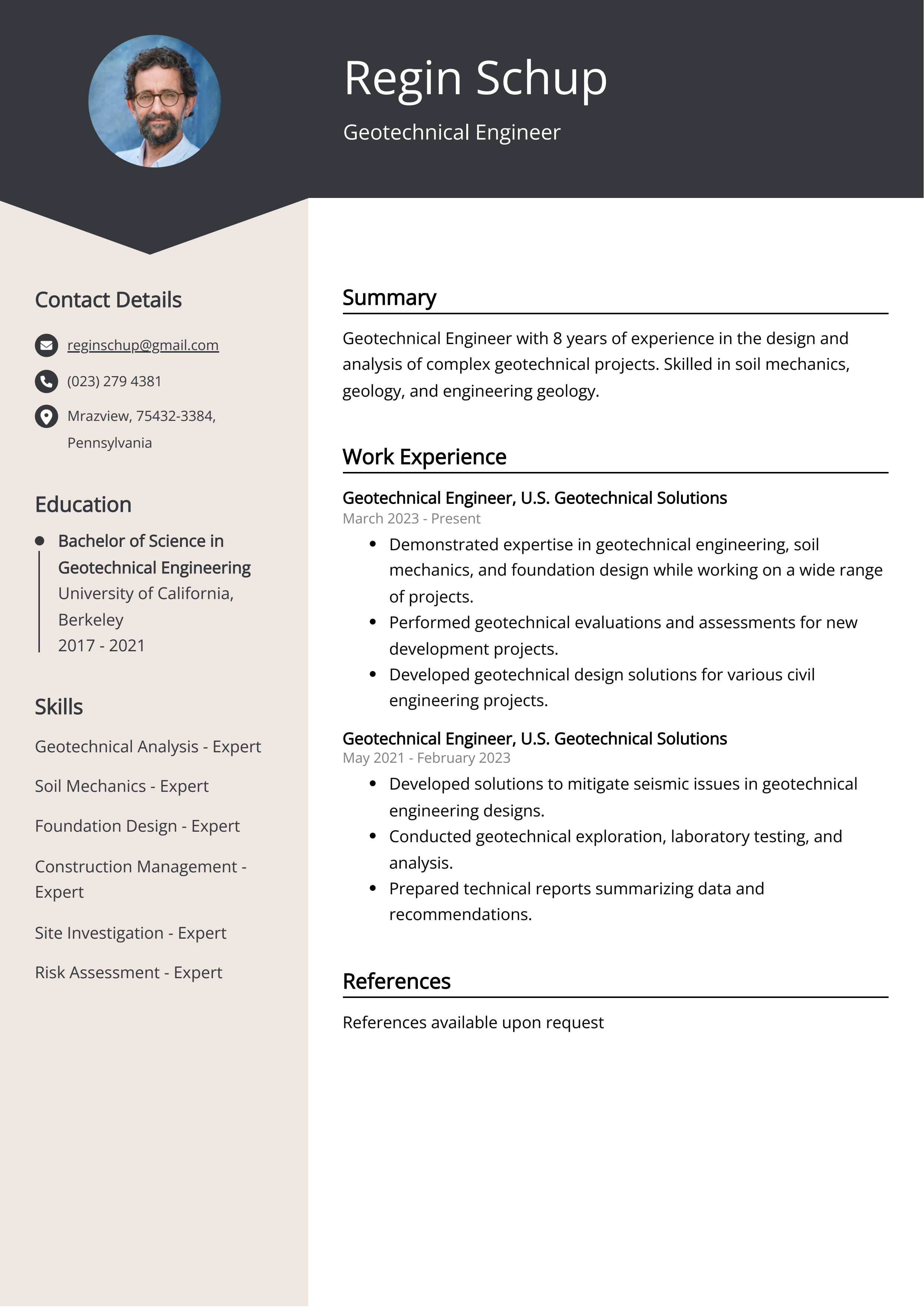Rumored Buzz on Geotheta
Rumored Buzz on Geotheta
Blog Article
Rumored Buzz on Geotheta
Table of ContentsGeotheta - The FactsThe Main Principles Of Geotheta Some Known Incorrect Statements About Geotheta Geotheta - The FactsThe Geotheta Ideas

They conduct site investigations, gather examples, execute laboratory tests, and evaluate information to review the viability of the ground for construction jobs - Geo Tech Engineering. Based on their searchings for, geotechnical engineers supply suggestions for structure style, incline stability, preserving frameworks, and mitigation of geotechnical dangers. They collaborate with other specialists, such as engineers, structural designers, and building groups, to make sure that geotechnical factors to consider are incorporated into the general task style and implementation
By evaluating the actions and buildings of soil and rock, they can identify potential geotechnical dangers such as landslides, soil negotiation, or slope instability. Their experience assists stop failings or mishaps that can endanger lives and building. Below are some in-depth tasks and duties of a geotechnical designer: Website Investigation: Geotechnical designers conduct site examinations to collect information on subsurface problems.
They translate the information to recognize the homes and behavior of the dirt and rock, including their strength, permeability, compaction attributes, and groundwater conditions. Geotechnical Analysis and Layout: Geotechnical engineers examine the information gathered during website examinations to evaluate the security and suitability of the site for building projects. They carry out geotechnical estimations and modeling to review aspects such as bearing ability, settlement, slope security, side earth pressures, and groundwater circulation.
The Ultimate Guide To Geotheta
Foundation Layout: Geotechnical designers play an essential role in designing foundations that can securely sustain the desired framework. They evaluate the dirt conditions and lots demands to determine the ideal foundation type, such as shallow foundations (e.g., footings), deep structures (e.g (https://www.producthunt.com/@geotheta1)., heaps), or specialized techniques like soil enhancement. They consider factors such as settlement limits, bearing ability, and soil-structure communication to develop ideal structure designs
They evaluate building and construction plans, display website tasks, and perform field evaluations to validate that the layout referrals are complied with. If unpredicted geotechnical concerns develop, they evaluate the circumstance and provide referrals for removal or changes to the style. Danger Evaluation and Mitigation: Geotechnical engineers evaluate geotechnical threats and risks related to the project site, such as landslides, liquefaction, or dirt erosion.

Partnership and Interaction: Geotechnical designers work closely with other specialists associated with a project, such as designers, architectural designers, and construction teams. Efficient communication and collaboration are vital to integrate geotechnical factors to consider right into the general task design and building process. Geotechnical designers supply technological competence, answer queries, and make certain that geotechnical needs are fulfilled.
Things about Geotheta
Below are some kinds of geotechnical engineers: Structure Engineer: Structure engineers focus on developing and assessing structures for structures. They analyze the dirt problems, load demands, and site features to establish one of the most ideal foundation kind and layout, such as shallow foundations, deep foundations, or specialized techniques like heap foundations.
They examine the elements influencing incline stability, such as soil homes, groundwater conditions, and slope geometry, and establish strategies to avoid slope failures and mitigate threats. Earthquake Engineer: Earthquake engineers specialize in analyzing and creating frameworks to stand up to seismic forces. They evaluate the seismic risk of a website, examine dirt liquefaction capacity, and establish seismic style standards to ensure the safety and security and strength of structures during quakes.
They do field testing, accumulate examples, and assess the collected data to define the dirt residential or commercial properties, geologic developments, and groundwater problems at a website. Geotechnical Instrumentation Designer: Geotechnical instrumentation website link engineers focus on surveillance and measuring the behavior of soil, rock, and frameworks. They mount and keep instrumentation systems that keep an eye on factors such as soil negotiation, groundwater degrees, incline motions, and architectural variations to examine performance and offer very early cautions of potential problems.
How Geotheta can Save You Time, Stress, and Money.
They carry out tests such as triaxial tests, combination tests, straight shear tests, and leaks in the structure examinations to collect information for geotechnical evaluation and layout. Geosynthetics Designer: Geosynthetics designers focus on the design and application of geosynthetic products, such as geotextiles, geogrids, and geomembranes. They utilize these products to boost dirt stability, reinforce inclines, supply drain remedies, and control disintegration.
They often tend to be investigatory people, which indicates they're intellectual, introspective, and investigative. They wonder, systematic, sensible, logical, and sensible. Some of them are additionally social, implying they're kind, generous, participating, individual, caring, useful, understanding, tactful, and pleasant. Does this seem like you? Take our free job test to learn if geotechnical engineer is among your top career matches.
In the office atmosphere, geotechnical designers use specialized software tools to perform computations, create layouts, and analyze information. They prepare records, testimonial task specifications, interact with customers and employee, and coordinate project activities. The workplace setup offers a helpful environment for research study, analysis, and partnership with other specialists associated with the job.
The 10-Minute Rule for Geotheta
They frequently go to project websites to conduct website investigations, examine geotechnical conditions, and collect information for evaluation. These visits include traveling to different locations, in some cases in remote or tough surfaces. Geotechnical designers may carry out soil sampling, conduct tests, and monitor building activities to guarantee that the geotechnical aspects of the project are being carried out properly.
Geotechnical designers likewise work in specialized geotechnical research laboratories. Geotechnical laboratory engineers work thoroughly in these settings, handling testing tools, running instruments, and tape-recording information.
Report this page